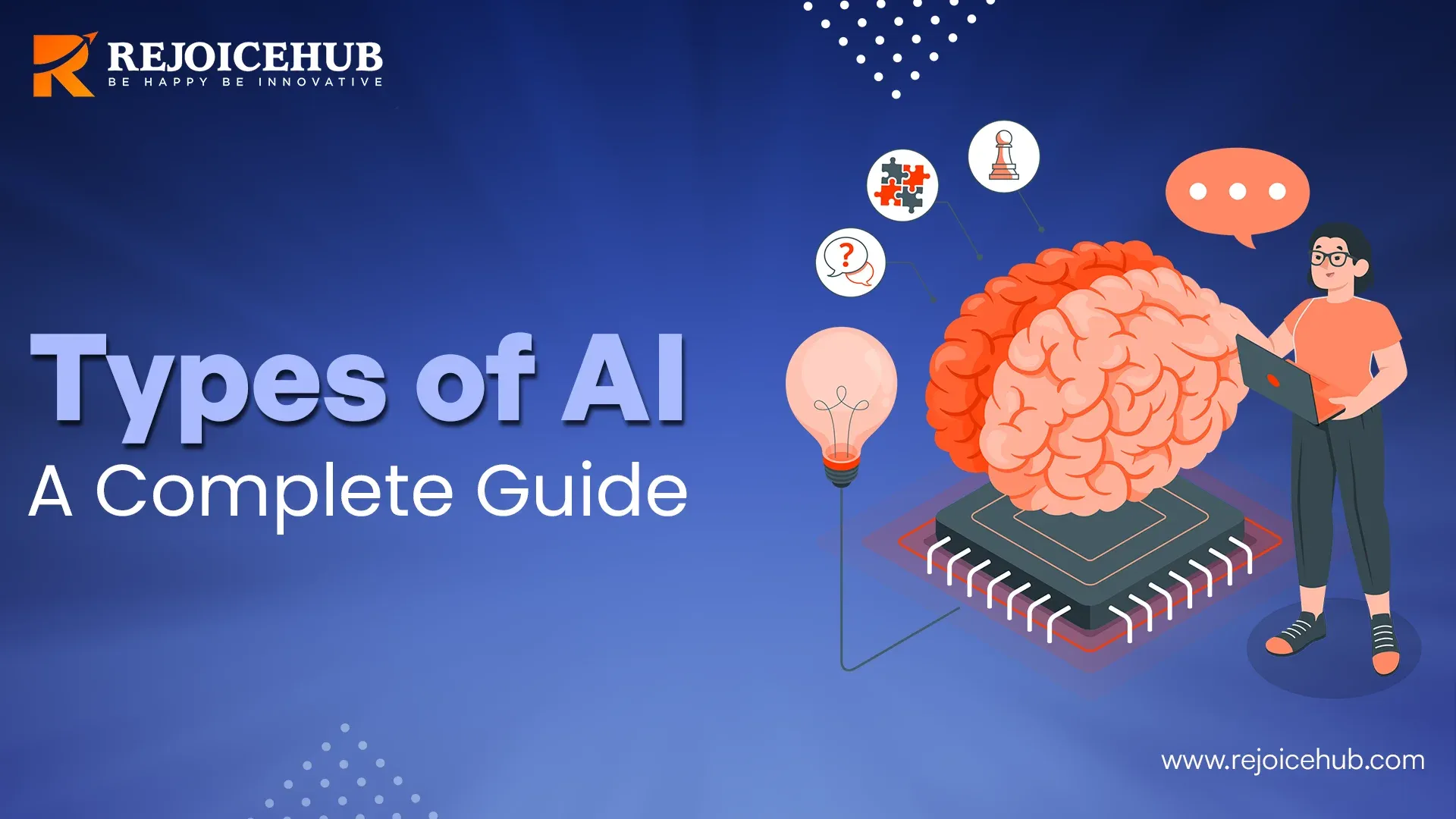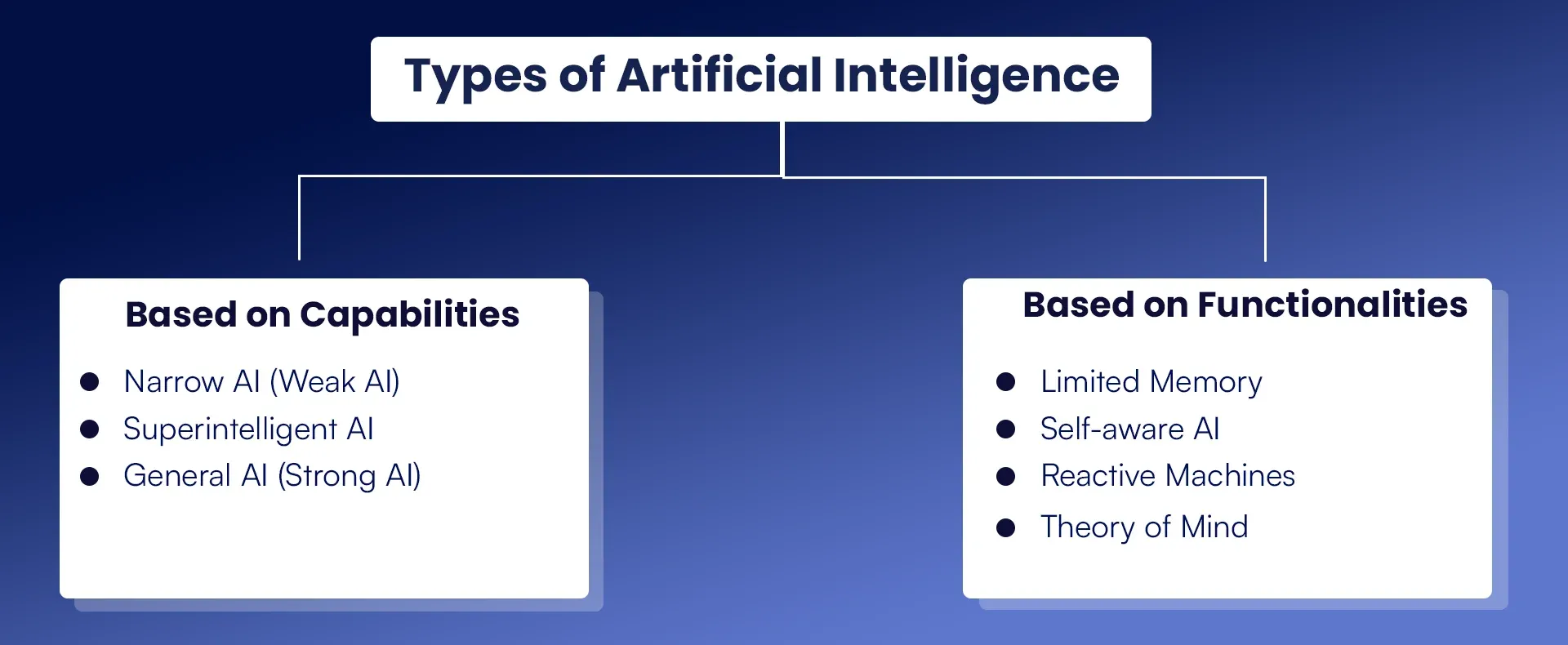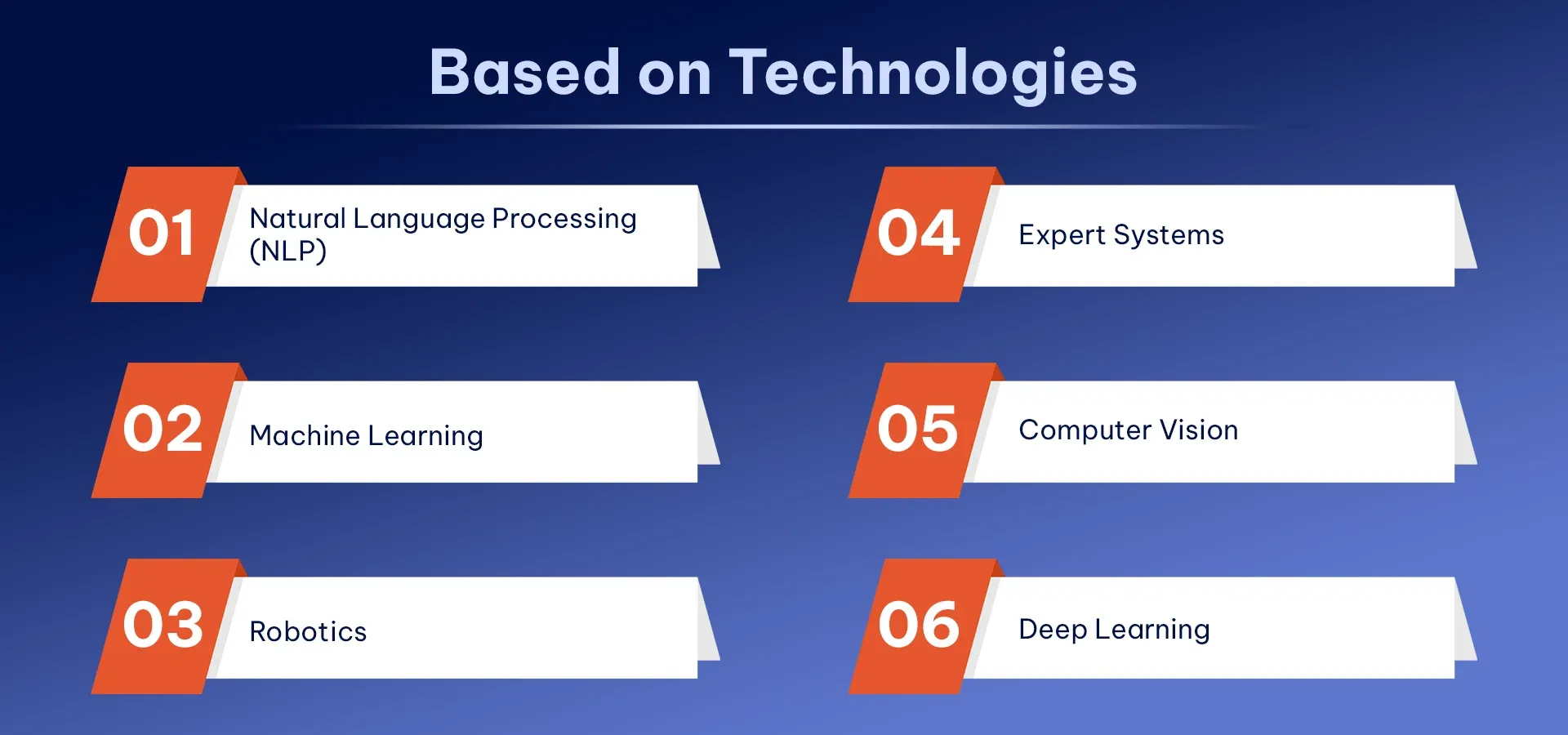
So... let's start by talking about the trending topic right now, AI.
What if machines could think and learn as a human brain can? Imagine a place where cars can drive by themselves, and apps can understand your moods. Doesn't it sound sci-fi? But this is what AI is and it’s already changing our lives.
AI isn't just about robots; it is something that is already around us. From Netflix being able to tell you what to watch next to the mechanism of mind reading and if you say anything to Alexa, it gets it. AI is a great innovation that brings us ease and intelligence. But did you know there are different types of artificial intelligence? Each type is made to do specific tasks and solve different problems.
Quick Summary
In this blog, we will take you through the categories of artificial intelligence. And will also show you what are the types of AI that make it all possible. Even if you’re new to AI or just curious to know about AI, this blog is here to simplify things for you!
What Is Artificial Intelligence?
Artificial Intelligence (AI) is a mechanism that copies the skills and abilities of human cognition which accordingly allows systems to carry out the same complicated and advanced functions as problem-solving, decision-making and language understanding. This is at the core of the newest developments that connect more individuals in their daily activities.
Types of artificial intelligence are categorized based on capabilities, functionalities and technologies. These include systems like Narrow AI, General AI and Superintelligent AI, as well as levels such as Reactive Machines and Self-Aware AI. Technologies like natural language processing, robotics and deep learning constantly push AI further.
Types of Artificial Intelligence
The three main categories of artificial intelligence are: capabilities, functionalities and technologies. Each type represents a step in the evolution of intelligent systems, which explains the learning and interaction of machines with their surroundings.

Based on Capabilities
A method to distinguish various AI types is to group them into Narrow AI, General AI and Superintelligent AI. These AI forms refer to the shift starting from systems designed to likely be a completion of the assigned task up to the superintelligent ones which might go beyond human difficulties.
1. Narrow AI (Weak AI)
Narrow AI focuses on the specialization of a certain skill or task, like speech recognition and product recommendations. This is the most widespread AI among us and can be seen in virtual assistants like Siri, Alexa, and Netflix. Although it is efficient, it cannot perform beyond what it is programmed for.
2. General AI (Strong AI)
AI General is a stand-alone cognitive system that closely resembles a human being in its thinking and acting. It can acquire knowledge from the environment, think logically and contain domain-specific knowledge to be applied in the context of any problem without coding being necessary. Even though it is still on paper, General AI may be able to perform tasks as efficiently as human beings.
3. Superintelligent AI
Superintelligent AI is the intelligence level of a machine that is smarter than human intelligence and capabilities. Moreover, it can solve issues that are too complicated for humans to innovate and make decisions beyond the capabilities of human beings. While fascinating, it also raises ethical concerns and is still in the stage of research.
Based on Functionalities
Artificial Intelligence is an area of development that gives machines the capability to act well in various situations without a single human intervening. AI encompasses places such as reactive machines, limited memory, theory of mind and self-awareness, which suggest the existence of several distinct features and uses.
1. Reactive Machines
Reactive machines are the simplest types of AI. They respond to immediate inputs without storing past experiences. Let's consider the example of IBM's Deep Blue, an AI that plays chess. It is not capable of learning from its previous games instead it only suggests moves that might be good
2. Limited Memory
This type uses past data to make decisions. Autonomous vehicles, for instance, rely on sensors and historical data to predict traffic and ensure safety. These systems are continuously evolving and adapting by incorporating new information. AI provides strategic and predictive analysis for visual analytics.
3. Theory of Mind
AI systems with a Theory of Mind understand emotions, beliefs, and social interactions. Though still in development, they aim to improve human-machine collaboration. These advancements hold promise for applications in education, healthcare and customer service, enhancing overall user experience.
4. Self-aware AI
The most advanced levels of AI, Self-aware AI, can think, feel, and understand itself. It’s purely theoretical at this stage but represents the goal of AI development, aiming to create machines with human-like consciousness. This would change numerous fields by enabling unprecedented levels in AI systems.
Also read: Artificial Intelligence Companies in India
Based on Technologies
Artificial intelligence progresses by applying technologies such as Natural Language Processing, Machine Learning, Robotics, Expert Systems, Computer Vision and Deep Learning. It is the main characteristic of these technologies to innovate in areas needed in people's everyday lives, be it computer systems that go through, analyze and take intelligent actions.

1. Natural Language Processing (NLP)
NLP enables computers to understand and interact with human language. From chatbots to translation tools, NLP facilitates the tele communicative process between humans and machines. This technology helps computers understand what we say and respond appropriately. It makes interactions with machines more natural and effective.
2. Machine Learning
Machine learning is the ability of a system to become intelligent through the study and usage of data. These systems learn and improve over time by analyzing patterns in data. They can spot unusual activities that might indicate fraud. They also suggest content you might like based on your past behavior.
3. Robotics
AI in robotics combines intelligent systems with mechanical engineering for effective applications. Robots with AI can be involved in real projects like surgery, assembly line work and space exploration. These robots can perform tasks with precision and efficiency, enhancing their usefulness in various fields.
4. Expert Systems
Such systems copy human decision-making by using rules and logic. Thus, industries like healthcare and finance employ expert systems for diagnostic and risk analysis. These systems can quickly analyze data and provide recommendations and help professionals make informed decisions faster.
5. Computer Vision
Computer vision is the process through which machines learn to interpret visual data. For e.g. recognizing faces or identifying objects in images. It is widely used in the security sector, the healthcare sector, the retail sector, etc. This helps machines make decisions based on what they observe.
6. Deep Learning
Deep learning is a technique used in machine learning that makes use of neural networks to explore massively big datasets. It is the technology that underlies applications like facial recognition and voice assistants. Deep learning also powers advanced systems like self-driving cars and helps predict trends.
Conclusion
AI is not only a term that people talk about—it is a technology that has been developed to completely change every sphere of human life. From Narrow AI solving specific problems to theoretical Self-aware AI, the types of AI are as diverse as their applications.
AI is changing the sectors like healthcare and finance thus, both of them are getting more efficient and performant. For example, it is equipped with different technologies, from smart house appliances to the digital assistant in your car. Therefore, we are enjoying our interactions with technology more. With AI, we will be able to create something new that will go far beyond the methods we use and the areas we work in at the moment. And Rejoicehub LLP provides you Artificial Intelligence and Machine Learning services. Using this service, you can create apps or websites for your business and automate your business and grow your business.
Frequently Asked Questions
1. What are the various forms of AI?
Forms of AI are Narrow AI, General AI, Superintelligent AI, Reactive Machines, Limited Memory and more.
2. What is the difference between Narrow AI and General AI?
Narrow AI can manage only a particular job while General AI would be able to perform any intellectual task that a human can.
3. Which AI level is the most advanced?
Self-aware AI is the most advanced level of AI but it's theoretical.
